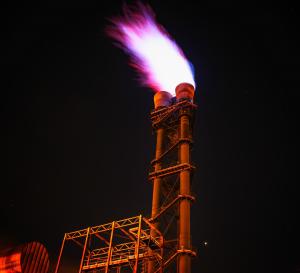Tackling emissions of methane now is essential to meet the Paris Agreement goal of limiting temperature rise to 1.5 °C above pre-industrial levels by 2050. With political momentum building fast for methane mitigation and, as emissions measurement continues to sharpen through satellite and other technologies, the Global Methane Forum brought together leaders to help turn commitment into real cuts in methane emissions.
The Global Methane Initiative (GMI) and United Nations Economic Commission for Europe (UNECE), in partnership with the Global Methane Hub and the UNEP-convened Climate and Clean Air Coalition (CCAC), hosted the Global Methane Forum on 18-21 March 2024 at the Palais des Nations in Geneva, Switzerland.
Nearly five hundred participated in-person with hundreds more online – including national and international policymakers, country representatives, project developers, and organizations – from more than 50 countries, sharing replicable successes to catalyze methane emission reductions in line with the Global Methane Pledge, which aims to reduce global methane emissions at least 30% from 2020 levels by 2030, and now has 157 countries and the European Union on board.
A powerful greenhouse gas, methane has a warming effect over 80 times greater than CO2 over a 20-year timeframe, which means action to cut emissions now can unlock significant near-term benefits for climate action. Methane is responsible for around 30% of total warming since the Industrial Revolution and is the second largest contributor to global warming after CO2.
Turning pledges into action
UNECE Executive Secretary Tatiana Molcean opened the plenary session on Tuesday by making a global call to mobilize more ambitious action on methane, “Hand in hand with decarbonization of energy systems, methane emissions need to be addressed in governments’ plans for stronger climate action. Meeting the goals currently set in the Global Methane Pledge has the potential to reduce global warming by at least 0.2° C by 2050. In view of the devastation and suffering caused by extreme weather events, in particular in the most vulnerable countries, the world can simply not afford to miss this opportunity.”
In his welcoming remarks, GMI Chair and Deputy Assistant Administrator of the Office of Air and Radiation for the United States Environmental Protection Agency, Tomás Carbonell, noted “This event marks the Global Methane Initiative’s 20th anniversary as a global public-private partnership that, since 2004, has led the way on advancing technical understanding to reduce methane, a potent greenhouse gas that contributes about one-third of today’s warming. GMI has created networks of people around the world who can act on methane and achieve ambitious reductions. We are grateful to see the world rallying behind this important effort as we know that together we can mobilize greater methane action.”
Emissions reduction is highly cost-effective
According to IEA, over 75% of methane emissions from oil and gas operations and 50% of emissions from coal today can be abated with existing technology. Guidance documents such as those developed by the Forum’s partners can help countries and industry worldwide deliver cost-effective methane cuts. These include UNECE guidance documents to support methane mitigation in the oil and gas sectors, and for both operating and abandoned coal mines (which can continue to leak methane years after operations cease).
35% of oil and gas emissions and 10% of coal mine emissions could be avoided at no cost. 44% of oil and gas emissions & 59% of coal mine emissions could be avoided at a cost of $30/MTCO2 Equivalent. The largest methane emitters (e.g., United States, China, India) show significant mitigation potential at lower range costs (e.g., $10/MTCO2 Equivalent).
As the only global methane-focused event occurring between the Conference of Parties (COP) 28 and COP 29 to be hosted by Azerbaijan in 2024, the Forum further increased the international momentum on methane and helped to mobilize action on methane mitigation.
Rick Duke, Deputy Special Envoy for Climate, Executive Office of the President of the United States, said “Methane is the fastest way to reduce near term warming and essential to keep 1.5 within reach. GMI has led the way in demonstrating how to reduce methane across sectors and laid a foundation to achieve the Global Methane Pledge goal of reducing emissions 30% by 2030.”
The Forum sessions featured innovative and proven methane mitigation activities across major methane-emitting sectors: biogas, coal mines, and oil and gas systems. Session panelists shared their experience and lessons learned on technical, policy, financing, and regulatory issues related to methane policy and project development. The Forum included a Methane Action Showcase, featuring more than 30 effective methane mitigation activities and productive uses of recovered methane around the world.
Marcelo Mena, Chief Executive Officer of the Global Methane Hub, said "In the ongoing fight against climate change, optimistic pledges must give way to decisive action. The Global Methane Forum served as a beacon of hope, rallying nations and industries to confront the methane challenge head-on, collaboratively. Let's seize this opportunity to mobilize finance, drive innovation, and deliver tangible results in our mission to curb methane emissions. Together, we can make a profound impact on our planet's future."
“Including methane reduction targets and measures explicitly into the upcoming round of NDCs is a way to unlock finance. Comprehensive policies can drive investments in technologies and practices to scale up methane reductions – alongside decarbonization – to bend the curve fast enough. Science tells us that we might hit 1.5-degree warming - the Paris Agreement’s goal for limiting warming - within the next 5 years. Our Methane Roadmap Action Programme (M-RAP) and its associated workshops provide a unique opportunity for countries to work on methane and other super pollutant’s inclusion into their NDC 3.0. We look forward to working closely with GMI in the coming years, as we provide policy support as well as technical and economic assessments of solutions that are promising but underinvested,” said Martina Otto, Head of the UNEP-convened Climate and Clean Air Coalition Secretariat.
To learn more about the 2024 Global Methane Forum, visit: globalmethane.org/2024forum


